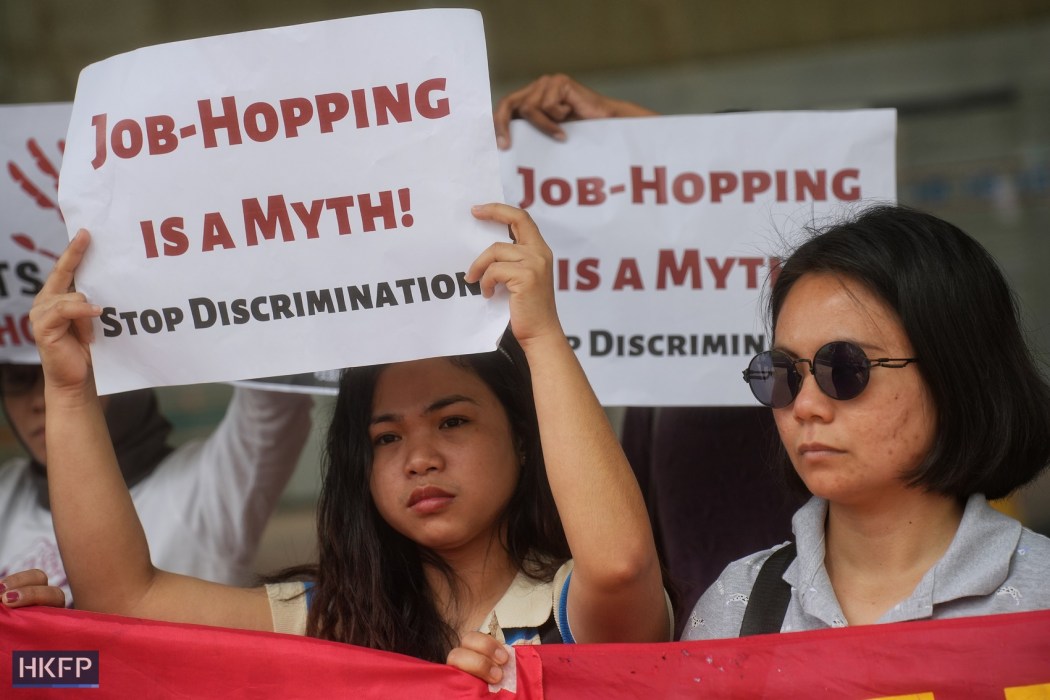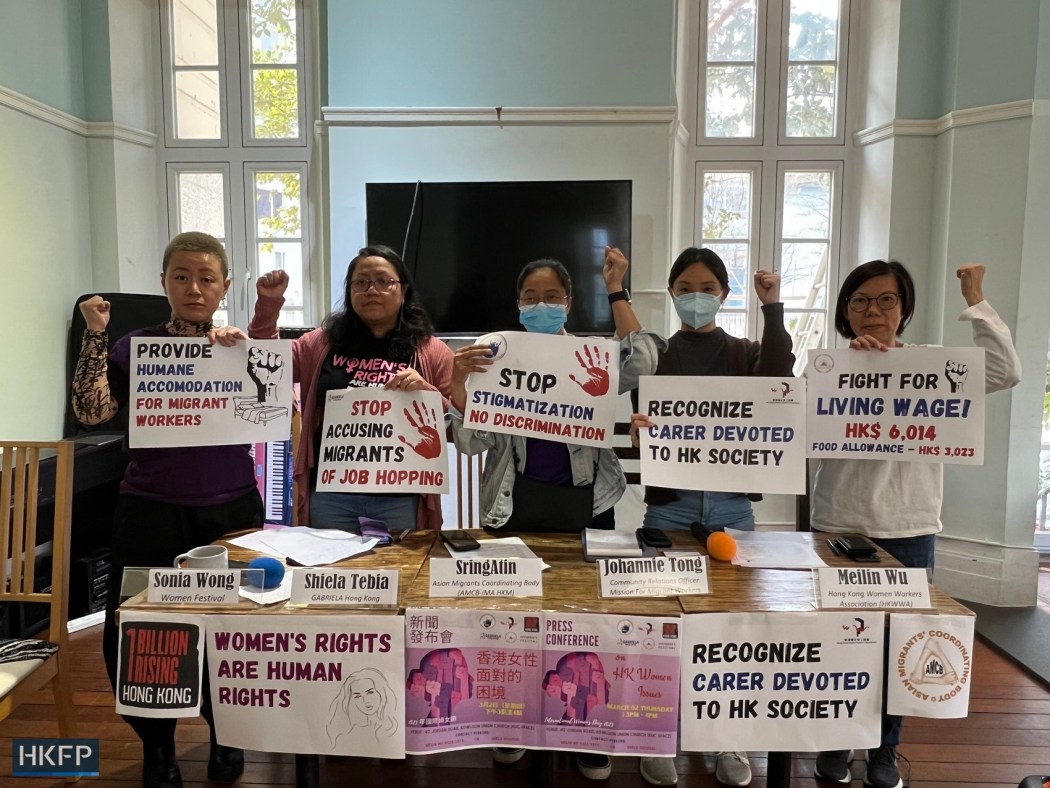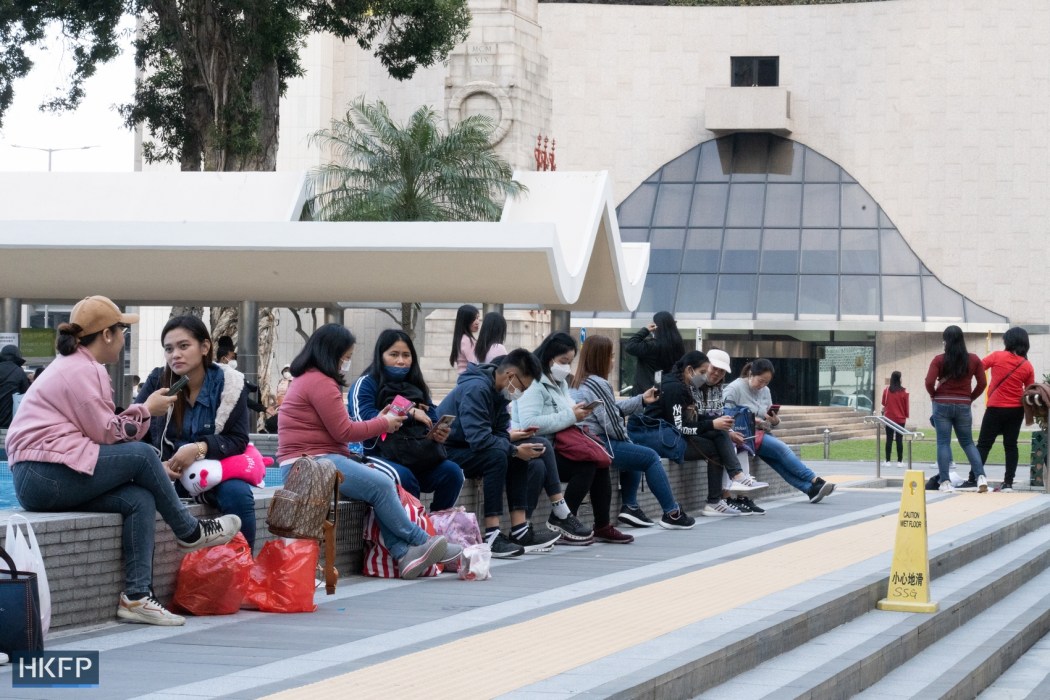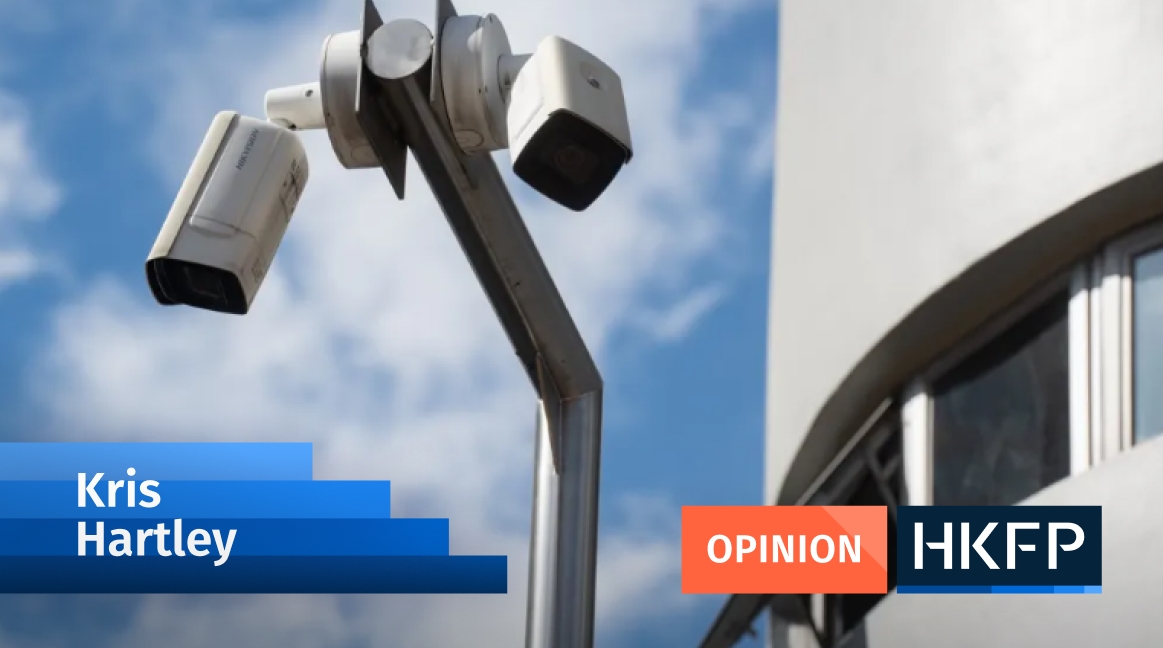By Lydia Catedral
I had a baby in Hong Kong in 2021, which highlighted for me how important caregiving support is – especially in a pandemic.

In a recent meeting I attended, Assistant Commissioner to Labour Cheung Hoi Shan claimed that it was families like mine – those who had babies or seniors in their homes during Covid-19 – that motivated the government to combat the “job-hopping” of domestic workers.
According to Cheung, migrant domestic workers caused their employers a “great inconvenience” when they terminated their contracts after the family had paid “a large sum of money” to bring them to Hong Kong. This conveniently omits the fact that it was government mandated quarantines and testing that doubled the costs employers had to pay to hire migrant domestic workers, and that the government’s management of school closures and elderly care had increased families’ caregiving needs.
Diverting attention away from government mismanagement and pitting employers against domestic workers – as both Cheung’s comments and the latest provisions on job-hopping do – are tactics to convince families like mine that these workers were the cause of our pandemic hardships, rather than people who were suffering and working alongside us.
I am unconvinced because I have seen first-hand how – despite facing intense discrimination during the pandemic – migrant domestic worker-led organisations reject animosity and choose an inclusive solidarity with other migrants, working class people in Hong Kong, and even employers.

Through my research and solidarity work with the Asian Migrants Coordinating Body (AMCB) and other migrant-led organisations during the pandemic, I saw how their members and leaders struggled. They lost parents and siblings to the virus, could not manage to send home enough money to cope with inflation, had their contracts terminated when their employers had financial trouble or left Hong Kong, went for years without visiting their own young children due to travel restrictions, and faced increased demands in their work due to school closures and work from home policies.
While many of these hardships were shared with others in Hong Kong, migrant workers also face the particular challenges of being both targeted and excluded by the Hong Kong government. They were not included in any of the consumption voucher schemes, and were singled out for mandatory vaccinations and “rest at home” provisions. Domestic workers were also repeatedly accused of job-hopping, causing thousands of their visas to be revoked without due process.
The evidence clearly shows that rather than taking advantage of the situation for their own benefit, migrant domestic workers were disproportionately negatively impacted by the pandemic in Hong Kong.
Despite being scapegoated as “virus carriers” and now as “the cause of hardship for families in Hong Kong,” I have been amazed by how the migrant leaders I know have never framed employers, local people or other residents in Hong Kong as the enemy.

Instead, the AMCB has called for more solidarity. They draw attention to bad policies rather than making generalisations about all employers. In an interview, spokesperson Sringatin noted that it is often female employers who physically abuse domestic workers “because we know that women are also suffering from the system itself.”
She added: “You are not our enemy, but we need to be united to get our dignity”.
The AMCB recognises that migrants and other working-class people in Hong Kong share a common struggle, so that even when they are writing statements about their outrage at being excluded from consumption vouchers, they simultaneously call for attention to be given to the “poor people of Hong Kong who are also suffering in this pandemic”.
Similarly, their campaign for wage increase is “Living Wage for All,” with AMCB spokesperson Eman Villanueva noting in an interview that “This is not only referring to the migrant domestic workers. The minimum wage in Hong Kong, including the statutory minimum wage for local workers, is actually less than the living wage level.”

Furthermore, while the government’s narrative on job-hopping pretends to sympathise with Hong Kong residents and locals by placing blame on a group of people who are culturally and socially different, the AMCB has been building solidarity across culturally different groups of migrant workers for over 25 years.
When migrant workers are viewed as a homogeneous group, it can be easy to overlook how remarkable it is that the different nationalities that make up the AMCB – Thais, Nepalese, Sri Lankans, Filipinos and Indonesians – come together to work for one another’s rights and welfare despite linguistic and cultural differences.
During Hong Kong’s deadly fifth wave of Covid in early 2022, members distributed care packages to each other. Adhering to social distancing regulations, they held rallies at the Central Government Offices to advance their common causes as migrant domestic workers whose rights are constantly under attack. If these workers – who were already vulnerable and were made even more so during the pandemic – find the strength for solidarity, how can we do less?

Around the world, the hardships we encountered during the pandemic were the very real results of both a deadly virus and government mismanagement. To now take the Hong Kong government’s view that migrant workers are to blame for our families’ pandemic hardships – and to turn on each other by labelling migrant domestic workers as “job-hoppers” – is not the way forward.
Solidarity with migrants can take many forms, but it starts with rejecting the narrative of job-hopping and instead listening to the narrative of grassroots, migrant-led organisations. This also means turning to their campaigns to better understand what constitutes just treatment of migrant workers, rather than relying on the wholly insufficient labour stipulations from the Hong Kong government.
As we leave behind the last Covid-19 restrictions in Hong Kong, solidarity with migrants, a recognition of our common suffering, and collective action towards a post-pandemic Hong Kong that is better for all may seem idealistic. But in reality, migrant-led organisations have already laid out a blueprint for this work, and solidarity is a more practical way to address our shared hardships, than believing the myth that combatting job-hopping will save us.
Lydia Catedral is a sociolinguist and Assistant Professor in Linguistics and Translation at City University of Hong Kong. She has conducted research and solidarity work with AMCB and other migrant-led organizations since 2019. Her research team — the Migrant Sociolinguistic Research Group — drafted this submission to the Labour Department opposing the “job-hopping” provisions of the proposal to amend the Code of Practice for Employment Agencies.
Support HKFP | Policies & Ethics | Error/typo? | Contact Us | Newsletter | Transparency & Annual Report | Apps
| HKFP is an impartial platform & does not necessarily share the views of opinion writers or advertisers. HKFP presents a diversity of views & regularly invites figures across the political spectrum to write for us. Press freedom is guaranteed under the Basic Law, security law, Bill of Rights and Chinese constitution. Opinion pieces aim to point out errors or defects in the government, law or policies, or aim to suggest ideas or alterations via legal means without an intention of hatred, discontent or hostility against the authorities or other communities. |
Help safeguard press freedom & keep HKFP free for all readers by supporting our team

More HKFP OPINION:
HKFP has an impartial stance, transparent funding, and balanced coverage guided by an Ethics Code and Corrections Policy.
Support press freedom & help us surpass 1,000 monthly Patrons: 100% independent, governed by an ethics code & not-for-profit.










